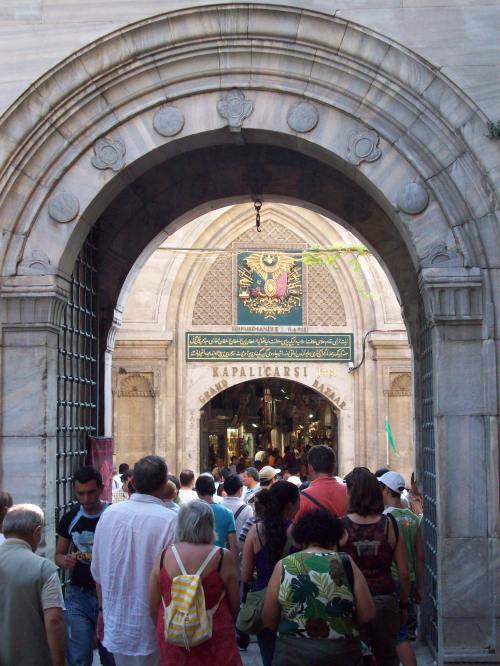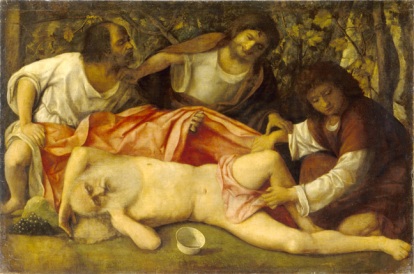I arrived in Tel Aviv ready for a long night’s sleep, but around me the city seemed to just be waking up. Allenby Street, where my hostel was, is full of nightclubs and shawerma stands and—uh-oh—sex shops with things on display that I don’t care to discuss in detail. Young Jews paraded through the streets in high heels and miniskirts. I was perplexed.
This is Israel?
The next day I walked down the beach to Old Jaffa. It was as if the whole city was on vacation. Hordes of gorgeous Jews in swim trunks and bikinis eating ice cream and playing volleyball. A promenade—a promenade!—of patterned brick spanned the entire length of the beach. Every three hundred yards or so there would be a station with outdoor workout equipment, where Israelis stop to do pull-ups, apparently, in the middle of their morning jog.
I stopped for a minute and watched. Israel’s flag flapping in the wind, tanned couples making out in the sunshine, the Mediterranean tides flirting with white sand and a warm breeze . . .
Then my mind flashed northward, westward, to long lawns and deep ditches, to train tracks and cattle cars, to mothers screaming as their children are torn from their arms, to the last shower and the final furnace . . .
A few days after departing Tel Aviv I visited Yad Vashem, Israel’s Holocaust memorial. This building is how Israel remembers the Holocaust as a nation. Thousands of people visit every year to remind themselves of what happened (not even 75 years ago!) in the heart of Western civilization. I’ve written about it here before, so I won’t go into the unspeakable horror (words can never suffice) that was the Final Solution.
But what I am particularly interested in here is how Yad Vashem, as a museum, is about more than just the Holocaust. You enter into the side of a hill and are thrust underground. You walk through exhibit after exhibit chronicling the different stages of the Holocaust, seeing artifacts (relics?), watching videos, hearing recordings. At the end, however, you come out of the other side of the hill onto a balcony with an absolutely breathtaking view of the land. It’s in West Jerusalem, and the view opens westward onto the hill country.
But the land wasn’t really part of the Holocaust. But Yad Vashem is more than a memorial; it is Zionism in architectural form. It is an argument, a rationale, a narrative.
The story, by the end of the museum, is quite clear. After centuries of persecution epitomized in the Shoah, the Holocaust, the Jewish people have found redemption in their possession of the land. For the first time in thousands of years, Jews had a place of safety in the world. A place to call home.
Exile, persecution, return: it was and is a powerful story, and I have seen for myself how that power drives the Israeli psyche. This land has been the focus of Jewish longing for nearly 2,000 years. That’s a long time to want, and a long time to wait.
Now, I’m a postmodern. That word is loaded with all kinds of negative connotations for most Christians, so let me elaborate for a bit on what that means. By “postmodern”, I do not mean that I don’t believe in absolute truth. That’s a straw-man of postmodernism as I understand it. What I mean is that, as a postmodern, I feel obligated to look at all narratives with a certain skepticism.
Think, for example, about the driving narrative behind the westward expansion of the United States. Remember that video game “Oregon Trail” we all used to play in elementary school? You’d cross the Great Plains in a covered wagon and have to pick how much bread and salt you wanted to bring and decide when to hunt bison and sometimes drown when fording a river. But it was worth the risk, because westward expansion was the destiny of the United States, it was an adventure, the spirit of expansion, of new opportunities, and so on.
It’s a powerful story. But the fulfillment of that story came at a price, especially to the Native American population who had called much of the land we settled 150 years ago “home”. The story we had written for ourselves during this time, and the story we often learn in elementary school, leaves out—it marginalizes or ignores—the stories of the thousands and thousands of Native Americans who were displaced, taken advantage of, and killed to fulfill the American Dream. Acknowledging those other stories, of course, problematizes our own stories. It turns the good guys into the bad guys, or at least, it compromises their moral integrity. And it makes us uncomfortable—for good reason.
It is the same thing with the Zionist narrative. We cannot accept the Zionist narrative, however powerful it might be, without first investigating it more thoroughly.
During the days of Theodor Herzl, the founder of the Zionist movement and author of Der Judenstaat, “The Jewish State”, the rallying cry of Zionism was “a land without a people, for a people without a land!” It’s catchy, isn’t it? It’s powerful, it resonates with something in our hearts. How fitting.
But was it true?
No, of course, it wasn’t. The land wasn’t barren and empty at all, as the Zionist movement knew perfectly well. European Jews didn’t begin settling historic Palestine until the turn of the 20th century. The goal was to create a Jewish state, which requires (in theory) a Jewish majority. But by the 1920’s, the population between the Jordan and the sea was less than 30% Jewish. It was quite clear, from the beginning, that fulfilling the Zionist narrative required not only moving Jews in, but also kicking Arabs out.
Can you do this fairly? The Zionist leadership, of course, could ask them to leave. They could provide incentives for them to leave. But can you blame the Palestinians for wanting to stay in their ancestral homeland?
If they wouldn’t do it of their own free will, of course, then the only solution was to make them leave by force and by fear. And that is exactly what happened. During and just prior to the War of Independence in 1948, 750,000 Palestinians fled their homes in a panic. Most of them were told that they would return as soon as the war was over. Few, if any, of them did.
Palestinians remain the largest refugee group in the world today.

Before 1948—the year Israel declared its independence—there were about 500 Palestinian villages lying within the boundaries of what is now Israel. During and just after the war, 400 were destroyed, erased from the memory of the land entirely.
Why would you do this?
You would do it if you were trying to forget that Palestinians ever resided in Palestine. You’d do it if you were trying to erase somebody’s story from your own. But in doing so, of course, you cease to tell a true story and you begin to tell a lie. You’re hiding something.
Don’t believe me? Why bulldoze the villages then? Why pretend they were never there? Why hide something you’re not ashamed of?
Yad Vashem, the very center of Jewish remembrance of the Holocaust, was built over a Palestinian graveyard. There used to be a Palestinian village in front of the balcony at the end of the exhibit, but it was bulldozed so it wouldn’t impede the view of the land. A tour guide at Yad Vashem who used to mention this during his tours was fired.
Why? Why do it this way? Why, in the very place where you remember your own history of persecution, insist on forgetting another’s?
The Zionist narrative, it seems, is not only trying to remember the history of Jewish persecution in a certain way. It is also trying to forget about the persecution it has imposed on another people.
Can it succeed in the second without compromising the first?









